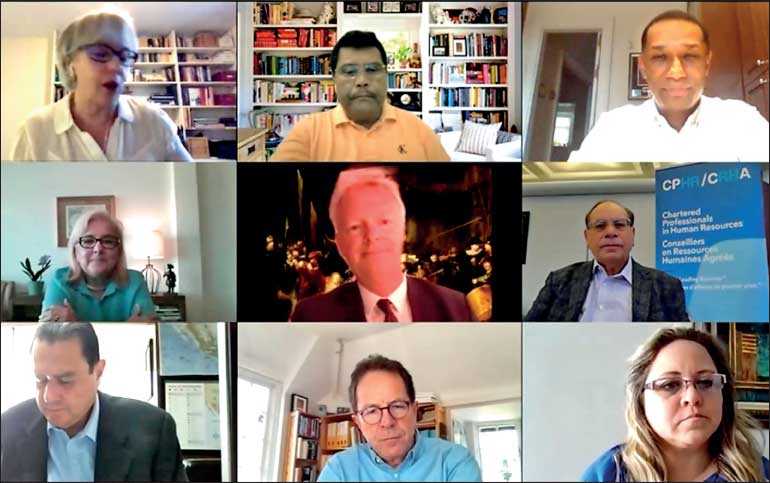Wednesday Feb 25, 2026
Wednesday Feb 25, 2026
Monday, 11 May 2020 00:00 - - {{hitsCtrl.values.hits}}

Participants at the ‘After the Great Lockdown’ roundtable
CIPM – the nation’s leader in human resource management joined a global roundtable of HR leaders gathered to discuss and seek consensus on necessary next steps to ensure workplaces recover from the COVID-19 pandemic and set the course for a healthy and thriving workforce. The global roundtable themed ‘After the Great Lockdown’ was held on 21 April under the auspices of the World Federation of People Management Associations (WFPMA).
The key participants were WFPMA President Leyla Nascimento, Chartered Professionals in Human Resources Canada President Chief Executive Officer Anthony Ariganello, SHRM (Society for Human Resource Management, USA) SHRM-SCP President and Chief Executive Officer Johnny C. Taylor Jr., Chartered Institute of Personnel and Development (CIPD), UK Chief Executive Peter Cheese, Chartered Institute of Personnel Management (CIPM), Sri Lanka President and Asia Pacific Federation of Human Resource Management (APFHRM) President Dhammika Fernando, Interamerican Federation of Human Resource Management (FIDAGH –Latin America), Panama First Vice-President Lisellotte Ortega, WFPMA, Mexico Immediate Past President Jorge Jauregui and European Association of People Management (EAPM), The Netherlands President Drs. Lucas L.G.M. van Wees, MBA/MBT.
The deliberations were moderated by Presseault Strategies+, Canada Principal Consultant Carole Presseault.
The roundtable discussion was convened in response to the COVID-19 health crisis which has resulted in shuttering of world economies, millions unemployed, hundreds of thousand employees furloughed, firms considering options for the future, and discussion about the vital work that will be required of human resource professionals in the future as leaders and as citizens.
“The way we work post the COVID-19 pandemic will never be the same again. There will be new challenges and new opportunities that we as HR leaders will be faced with in the new normal,” said CIPM Sri Lanka President and APFHRM President Dhammika Fernando.
“The Asia Pacific region is the most people rich region in the world, and the post COVID-19 era will never be same again bringing many testing, lasting changes to the world of work as we have known it. We as people professionals need to be prepared and people ready in the new world of work. The economic consequences on organisations in this region will be enormous,” he added speaking on behalf of CIPM Sri Lanka and the APFHRM.
Most of the Asian countries are severely depending on FDIs and exports-based income. These industries require governmental support for sustenance in ways of tax relaxation, duty rebates etc. in order to retain employees and generate more employment opportunities. However, these economies are hit with the scarcity of foreign reserves and the governments are not able to provide tangible stimulus packages to the industries to support then. Furthermore, many Asian economies do not have unemployment benefits other than retirement benefits for those in regular employment unlike in Western and European countries. The situation regarding daily wage earners, self-employed individuals, temporary/contract workers and the unregulated work sector do not have any benefits or security which poses a major risk from a people perspective.
“In order to support these economies and governments to come out of the current crisis, it is essential that global institutions such as the UN takes a more active role, and lending institutions such as the Work Bank, IMF, etc. take pragmatic measures including debt rescheduling in order to support these economies,” he added.
“Also, from a people perspective during this pandemic, SMEs in this region are showing a great deal of resilience and agility in facing this crisis with more people friendly, decision making which is indeed reassuring and heart-warming to note,” he further stated.
The roundtable concluded with the consensus that a ‘people first’ agenda is required as a way ahead for the workplace not just during the recovery period but in the long term. Businesses must strive not to revert to a controlling, cost cutting environment but rather design workplaces that are resilient, sustainable, agile, supportive and inclusive to drive employment security, innovation and productivity. Worker engagement will be critical to creating such a workplace, including through constructive engagement with government, business leaders, international bodies, civil society and labour.
The WFPMA is a global network of professionals in people management, founded in 1976 to aid the development and improve the effectiveness of professional people management all over the world. Its members are predominantly the continental federations which are made up of more than 90 national human resource associations representing over 660,000 people management professionals.